T&T Clark Jewish Studies Collection (6 vols.)
Digital Logos Edition
Overview
This collection from T&T Clark brings together important and thought-provoking topics regarding Jewish studies. These volumes present clear, detailed, current studies on Jewish narrative texts from the Hellenistic period, the view of salvation in Second Temple literature, and the concept of the Messiah from Jewish and Christian perspectives. Study these key topics as well as other themes and issues in Jewish studies with these volumes from T&T Clark.
The Logos Bible Software edition of T&T Clark Jewish Studies Collection is designed to enhance your study and understanding of Jewish studies. Scripture passages link directly to your English translations and original-language texts, and important theological concepts link to dictionaries, encyclopedias, and a wealth of other resources in your digital library. In addition, you can perform powerful searches by topic and find what other authors, scholars, and theologians have to say about soteriology and the Messiah.

Key Features
- A look at key issues surrounding Jewish and Christian thought
- Comprehensive overview of Scripture regarding the concept of the Messiah
- Historical analyses of Jewish studies
Product Details
- Title: T&T Clark Jewish Studies Collection
- Publisher: T&T Clark
- Volumes: 6
- Pages: 1,536
Individual Titles
- Breaking Monotheism: Yehud and the Material Formation of Monotheistic Identity by Jeremiah W. Cataldo
- Why Did Paul Go West?: Jewish Historical Narrative and Thought by Doron Mendels
- This World and the World to Come: Soteriology in Early Judaism edited by Daniel Gurtner
- Discovering the Traditions of Prose Prayers in Early Jewish Literature by Michael D. Matlock
- The Messiah: A Comparative Study of the Enochic Son of Man and the Pauline Kyrios by James A. Waddell
- The Concept of the Messiah in the Scriptures of Judaism and Christianity by Shirley Lucass
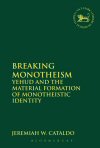
Breaking Monotheism: Yehud and the Material Formation of Monotheistic Identity
- Author: Jeremiah W. Cataldo
- Series: The Library of Hebrew Bible/Old Testament Studies
- Publisher: T&T Clark
- Publication Date: 2012
- Pages: 192
Breaking Monotheism makes the case that monotheism is a product of a contest for land and authority. Using the Persian province Yehud as its primary case study, Cataldo anlayzes the interaction between religion and the social-political body in several important areas: power relations in the province, land as private property and its economic impact, political structure and the “rule of law,” monotheistic religious identity in Palestine and its tendency toward “cultural” exclusion, and social group formation in the midst of conflict. This work develops a model through which to better understand the structural formations of later monotheistic religions.
Jeremiah Cataldo is assistant professor of history at Frederik Meijer Honors College, Grand Valley State University.
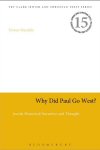
Why Did Paul Go West? addresses topics on the authority of texts and their transmission, as well as different strategies of narration in ancient texts. Doron Mendels provides extensive treatment of issues such as linearity, emporality, and simultaneity of texts, while working to examine four core themes. The first theme is the narrator and his strategies in the historiography of the Hellenistic period. The second theme is Jewish historical thought in the Hellenistic period and beyond. The third theme is issues of Hellenization in Palestine— power, honor, gifting, etiquette and sovereignty, and their presentation in the main narrative of the Hasmonean period. Finally, Mendels gives attention to the “split” in the Jewish diaspora between east and west, as exemplified from a Christian point of view. It is this that unites these themes into a sustained examination of Jewish historical narrative and thought.
Doron Mendels is one of our finest historians of Judaism in the Hellenistic age. In the series of essays that make up this splendid volume, he offers numerous fresh insights into early Jewish historiography. The essays are notable for their combination of theoretical sophistication and careful textual analysis. The series of studies on the political theology and rhetorical strategies of 1 Maccabees are especially welcome and whet one's appetite for Mendels’ forthcoming commentary on this vitally important book.
—Daniel C. Harlow, professor of religion, Calvin College
Doron Mendels is Max and Sophie Mydans Professor of Humanities in the department of history at Hebrew University of Jerusalem in Israel. His recent publications include: Identity, Religion and Historiography and The Media Revolution of Early Christianity.
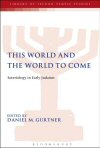
Did authors of Second Temple texts concern themselves with “salvation?” If so, on what terms? What does one need “salvation” from? Are the parameters of who is included in or excluded from “salvation” defined? Daniel Gurtner’s vision in compiling this collection is to collect contributions on a single topic as it is addressed in individual books from the Second Temple period. Working from a sound methodological basis, the contributors assess the theme in different books, taking into account issues of genre and provenance. This allows an acute comparison of how this topic is present across a myriad of Second Temple Jewish texts. Throughout the course of the work the notion of “soteriology” is very broadly conceived. While acknowledging the Christian connotation of the term “soteriology,” the volume similarly acknowledges the usefulness of the term as a heuristic category for careful analysis.
Soteriology in this volume serves as shorthand for the state of well-being that is the goal of life. The contributors are a distinguished selection of older and younger scholars, including some of the most prominent names in the field. The essays emphasize the diversity of ‘soteriologies’ in the literature of Second Temple Judaism. They provide a fascinating window on the theological diversity of Judaism in the era in which Christianity was born.
—John J. Collins, Holmes Professor of Old Testament, Yale University
Daniel M. Gurtner is an associate professor of New Testament at Bethel Seminary in Minnesota.
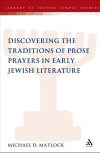
Discovering the Traditions of Prose Prayers in Early Jewish Literature
- Author: Michael D. Matlock
- Series: The Library of Second Temple Studies
- Publisher: T&T Clark
- Publication Date: 2012
- Pages: 256
In this volume, Michael D. Matlock analyzes five lengthy biblical prose prayers from the exilic and post-exilic period: Solomon’s prayer (1 Kings 8.14–61), Ezra’s prayer (Ezra 9.5–15), Nehemiah’s prayer (Nehemiah 1.4–11), the Levites’ prayer (Nehemiah 9.4–37), and the prayer of Daniel (Daniel 9:3–19). He also examines prayers from Second Temple literature, including texts from the Apocrypha and Pseudepigrapha, the writings of Philo and Josephus, and texts from Qumran. Matlock also discusses the Septuagintal versions of the five biblical prayers and Targum Jonathan’s treatment of Solomon’s prayer.
Michael D. Matlock is associate professor of inductive biblical studies and Old Testament at Asbury Theological Seminary in Wilmore, Kentucky. He received his PhD from Hebrew Union College in the Jewish Institute of Religion in the history of biblical interpretation.
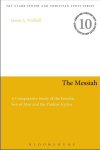
This volume discusses conceptual elements of messianic traditions that are identified in the Parables of Enoch and the Letters of Paul by examining the nature and functions of the divine figure and of the Messiah figure. Comparative analysis demonstrates that these works share specific conceptual elements of messianic traditions. The combination of shared elements is so striking as to preclude the possibility that the Parables of Enoch and the Letters of Paul constituted independent, parallel developments. While it cannot be claimed that Paul was necessarily familiar with the text of the Parables of Enoch, Waddell does show that Paul was familiar with the conceptual elements of the Enochic messiah and that Paul developed his concept of the Kyrios out of those Son of Man traditions. Waddell specifically argues Pauline Christology was at the very least heavily influenced by Enochic Son of Man traditions.
James A. Waddell is Philip Markowicz Visiting Assistant Professor of Jewish Biblical Studies at the University of Toledo.
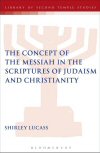
For 2000 years, Judaism and Christianity have been at odds with one another. The problem at the heart of the division is the concept of Messiah. Shirley Lucass looks directly at the concept of Messiah from a historical perspective and examines its roots in ancient Jewish literature and its development within the Christian tradition. This study traces the biblical and extra-biblical developments of the concept and outlines a platform for religious dialogue. Lucass begins with a survey of methodological approaches and then moves on to consider the origins of the Messiah concept in ancient Near Eastern kingship, the “anointed” in the Second Temple period, and the Messiah as outlined in the New Testament and in post 70 CE Messianism. Lucass contends that the New Testament concept of Messiah is not inconsistent with, nor incompatible with, Jewish traditions and it is this conclusion which enables her to present a valuable chapter on the implications of this study for inter-religious dialogue.
Shirley Lucass took her PhD from the University of Manchester.
This title is included in the following collections
You can save when you purchase this product as part of a collection.
2025 Ultimate Library
$23,999.99$23,999.99